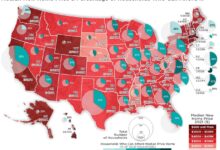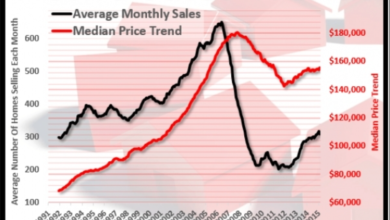Home Sales Plummet
Understanding the Causes and Impacts of Home Sales Plummet
In the intricate tapestry of the real estate market, the phenomenon of “home sales plummet” serves as a critical indicator of shifting dynamics and potential challenges within the industry. As the housing market experiences fluctuations influenced by various factors, understanding the root causes and implications of a decline in home sales is essential for stakeholders, from homeowners and buyers to real estate professionals. This article delves into the intricacies of home sales plummet, shedding light on its contributing factors and the ripple effects it generates in the broader real estate landscape.
1. Unraveling the Factors Behind Home Sales Plummet
1.1 Economic Downturns and Market Sentiment
Economic downturns are a significant factor contributing to a decline in home sales. During periods of economic uncertainty or recession, potential buyers often adopt a cautious approach, leading to decreased confidence in making significant financial commitments such as home purchases. Market sentiment plays a pivotal role in influencing buyer behavior, with concerns about job security, fluctuating interest rates, and overall economic stability impacting the decision-making process. Understanding the correlation between economic trends and home sales plummet is crucial for both buyers and sellers, allowing them to navigate the market with foresight and strategic decision-making.
1.2 Affordability Challenges and Mortgage Market Dynamics
Affordability challenges can also contribute to a decline in home sales. When property prices outpace income growth or when mortgage interest rates rise significantly, potential buyers may face difficulties in entering the market. Affordability constraints often result in a smaller pool of qualified buyers, reducing demand for homes and subsequently contributing to a slump in sales. Monitoring mortgage market dynamics, interest rate trends, and housing affordability indices provides valuable insights into the potential for a decline in home sales. Addressing these challenges requires stakeholders to adapt their strategies, such as adjusting pricing models or exploring financing options to stimulate buyer interest.
2. Navigating the Impact: Strategies Amidst Home Sales Plummet
2.1 Strategic Pricing and Property Positioning
In response to a market experiencing a home sales plummet, strategic pricing and property positioning become paramount for sellers. Adopting a realistic approach to pricing that reflects current market conditions is essential to attract potential buyers. Sellers should conduct thorough market analyses, considering comparable sales, local trends, and economic indicators to determine an optimal pricing strategy. Additionally, strategically positioning a property in the market involves highlighting unique features, addressing buyer concerns, and leveraging effective marketing techniques to enhance visibility. A well-executed pricing and positioning strategy can help sellers stand out in a challenging market environment.
2.2 Enhanced Marketing and Digital Presence
Amidst a downturn in home sales, enhancing marketing efforts and leveraging a robust digital presence become integral for both sellers and real estate professionals. Utilizing digital platforms, social media, and online advertising can amplify the reach of property listings and create visibility among potential buyers. Engaging and compelling marketing materials, including high-quality visuals and detailed property descriptions, can capture the attention of a smaller pool of potential buyers. Embracing innovative marketing techniques and staying ahead of digital trends contributes to maintaining relevance in a competitive market.
2.3 Flexibility in Negotiation and Transaction Terms
In a market where home sales plummet, flexibility in negotiation and transaction terms is a valuable strategy for both buyers and sellers. Buyers may have increased negotiating power, and sellers may need to consider adjusting terms to align with market conditions. This could involve exploring creative financing options, accommodating reasonable buyer requests, or being open to flexible closing timelines. The ability to navigate negotiations with adaptability and pragmatism positions stakeholders for success, fostering a collaborative atmosphere that can facilitate transactions even in challenging market scenarios.
In conclusion, the dynamics of a home sales plummet require a nuanced understanding of the contributing factors and strategic approaches for navigating its impact. Whether influenced by economic downturns, affordability challenges, or other market dynamics, stakeholders can respond effectively by adopting adaptive strategies, enhancing their digital presence, and embracing flexibility in negotiations. By staying informed and proactive, individuals within the real estate industry can navigate through challenging periods, mitigating the effects of a decline in home sales and positioning themselves for success in an ever-evolving market.









